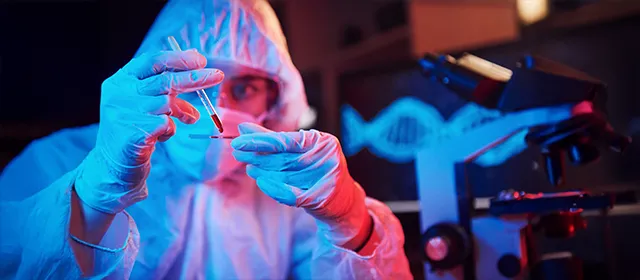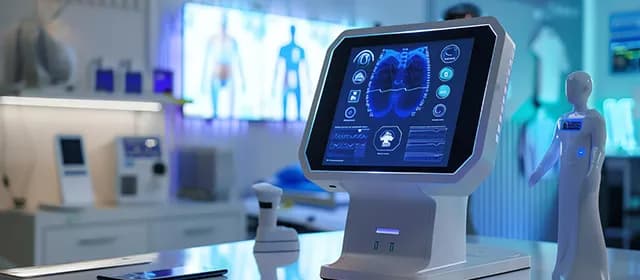Synthetic biology is no longer confined to academic laboratories; it is emerging as a transformative force in modern industry. By applying engineering principles to biological systems, synthetic biology enables the design of organisms with entirely new functionalities. Synthetic biology technologies could reduce industrial production significantly and prevent up to 30 gigatonnes of carbon emissions.
Furthermore, the UK research councils initiated the Synthetic Biology for Growth program in response to the UK government's proposals for synthetic biology research and investment, which included a £102 million ($136.2 million) investment (Source: https://www.ukri.org/). This underlines the government's commitment to this field.
For industrial leaders, understanding synthetic biology is no longer optional; it is a strategic necessity.
What Is Synthetic Biology and How Does It Fit into Industrial Strategy?
Synthetic biology is the intersection of biology, engineering, and data science. It’s designing and building new biological entities or redesigning existing ones for specific purposes. Unlike traditional biotech, synthetic biology is about standardized parts, automation, and computational design, so it’s more scalable for industrial applications. For industries, that means being able to create solutions for production problems, streamline supply chains, and achieve sustainability goals.
The industrial value of synthetic biology is in its versatility. It can produce complex chemicals, high-performance materials, and biologics at lower cost and with less environmental impact. The ability to engineer with precision can be a competitive advantage in industries from pharma to ag to energy to manufacturing.
Synthetic Biology Reshaping Industrial Applications
The global synthetic biology market is expected to generate a revenue of $78.74 billion by 2031, as per Kings Research’s projections. For industrial decision-makers, synthetic biology offers opportunities to rethink traditional manufacturing processes. For example, the U.S. Department of Agriculture (USDA) has invested heavily in synthetic biology research to develop bio-based fertilizers that reduce reliance on petrochemicals and improve soil health.
In 2025, the USDA awarded a $2.34 million grant to Alltech to establish a 15,000-square-foot facility in Kentucky dedicated to producing biological fertilizers and crop inputs (Source: https://www.alltech.com/). This effort is part of a broader USDA initiative, with $517 million allocated across 76 fertilizer production facilities in 34 U.S. states and Puerto Rico, aiming to increase domestic fertilizer production by 11.8 million tons annually (Source: https://www.usda.gov/).
In pharmaceuticals, synthetic biology enables precision manufacturing of biologics and personalized therapies. According to some reports, engineered microbial systems have reduced drug production timelines significantly. For industrial leaders, this translates into faster time-to-market and reduced development costs.
Beyond agriculture and pharmaceuticals, synthetic biology has industrial applications in materials manufacturing. For example, engineered microorganisms are now being used to produce biodegradable plastics, which could replace traditional plastics in high-volume manufacturing. This aligns directly with corporate sustainability agendas, increasingly mandated by global regulations.
Rising Adoption of Synthetic Biology
Several strategic drivers are fueling the adoption of synthetic biology. Technological advancement is at the forefront, making it economically viable for industrial-scale applications. Another driver is regulatory momentum, as governments worldwide recognize synthetic biology’s potential to address major challenges, from climate change to health crises.
The combined private and public investment in the synthetic biology sector totaled US$16.35 billion in 2023 (Source: https://pmc.ncbi.nlm.nih.gov/), underscoring the growing confidence in the technology’s industrial potential. Tracking federal investments in synthetic biology is challenging due to variations in how the field is defined; however, a Congressional Research Service (CRS) analysis of data reported to a federal repository found that from FY2008 through FY2022, selected U.S. government research funding for synthetic biology increased from about $29 million to nearly $161 million.
Finally, industrial demand for sustainability and efficiency is pushing companies toward synthetic biology. Organizations that integrate these technologies can meet growing regulatory pressure for environmentally friendly processes while gaining a competitive edge.
Strategic Benefits of Synthetic Biology
Synthetic biology offers multiple advantages:
- Operational Efficiency: By designing microorganisms that perform specific tasks, companies can streamline manufacturing processes and reduce costs.
- Sustainability: Bio-based production processes lower carbon footprints and reduce dependence on fossil fuels.
- Market Differentiation: Custom-designed biological products open doors to innovative offerings, enabling companies to stand out in competitive markets.
- Risk Mitigation: Synthetic biology allows for greater control over supply chains, reducing reliance on volatile commodity markets.
These benefits make synthetic biology a key element of industrial strategic planning, particularly for companies looking to future-proof operations.
Risks and Regulatory Challenges in Synthetic Biology
Despite the promise, synthetic biology isn’t risk-free. From a strategic perspective, industrial leaders need to consider regulatory compliance, ethics, and biosafety. For example, the US Government Accountability Office (GAO) has said regulatory frameworks need to be updated to address the unique challenges of synthetic biology.
Ethically engineered organisms raise questions about environmental impact and unintended consequences. Strategically, companies need to navigate these risks to avoid reputational damage. This means being proactive with regulators, transparent with stakeholders, and having robust governance frameworks.
How Can Industrial Leaders Adopt Synthetic Biology Effectively?
Adopting synthetic biology requires a strategic roadmap:
- Collaborative Ecosystems: Partnering with universities, biotech firms, and government bodies can accelerate innovation.
- R&D Investment: Directing resources toward synthetic biology research enables companies to develop proprietary solutions.
- Regulatory Engagement: Early engagement with regulatory bodies ensures compliance and smoother market entry.
- Workforce Development: Training teams in synthetic biology technologies ensures sustainable adoption.
The integration of synthetic biology should be seen as a long-term strategic investment rather than a short-term project.
What Does the Future Hold for Synthetic Biology in Industry?
The future of synthetic biology looks promising. Emerging trends like artificial intelligence (AI) with synthetic biology will make engineered systems more precise. AI driven synthetic biology will cut development times significantly.
International collaboration will be key as global standards and regulations emerge. This will ensure safe and ethical use of synthetic biology for industries worldwide.
For industrial leaders, the future of synthetic biology means a competitive advantage for those who get in early and get it right. Companies that use synthetic biology will innovate faster and align with global sustainability agendas, regulatory requirements, and market expectations.
Bottom Line
Synthetic biology is a paradigm shift, a convergence of biology, engineering, and data science that offers huge opportunities. For industrial leaders it’s a challenge and an opportunity to rethink manufacturing, innovate sustainably and win. The companies that get synthetic biology right will lead the industries of the future.

.webp&w=3840&q=75&dpl=dpl_HkC6vhtovZ9gdp5f4CCyQszcdnYs)

